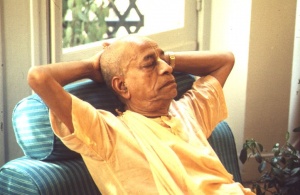SB 9.10.29: Difference between revisions
m (1 revision(s)) |
No edit summary |
||
| Line 1: | Line 1: | ||
{{info | {{info | ||
|speaker= | |speaker=Śukadeva Gosvāmī | ||
|listener=King | |listener=King Parīkṣit | ||
}} | }} | ||
[[Category:Srimad-Bhagavatam - Canto 09 Chapter 10]] | |||
[[Category:Bhagavatam Verses Spoken by Sukadeva Gosvami - Vanisource|091029]] | |||
<div style="float:left">'''[[Srimad-Bhagavatam]] - [[SB 9|Ninth Canto]] - [[SB 9.10: The Pastimes of the Supreme Lord, Ramacandra|Chapter 10: The Pastimes of the Supreme Lord, Rāmacandra]]'''</div> | |||
<div style="float:right">[[File:Go-previous.png|link=SB 9.10.28]] '''[[SB 9.10.28]] - [[SB 9.10.30]]''' [[File:Go-next.png|link=SB 9.10.30]]</div> | |||
{{RandomImage}} | |||
==== TEXT 29 ==== | ==== TEXT 29 ==== | ||
<div | <div class="verse"> | ||
śrī-śuka uvāca | :śrī-śuka uvāca | ||
svānāṁ vibhīṣaṇaś cakre | :svānāṁ vibhīṣaṇaś cakre | ||
kosalendrānumoditaḥ | :kosalendrānumoditaḥ | ||
pitṛ-medha-vidhānena | :pitṛ-medha-vidhānena | ||
yad uktaṁ sāmparāyikam | :yad uktaṁ sāmparāyikam | ||
</div> | </div> | ||
| Line 18: | Line 23: | ||
==== SYNONYMS ==== | ==== SYNONYMS ==== | ||
<div | <div class="synonyms"> | ||
śrī-śukaḥ | ''śrī-śukaḥ uvāca''—Śrī Śukadeva Gosvāmī said; ''svānām''—of his own family members; ''vibhīṣaṇaḥ''—Vibhīṣaṇa, the brother of Rāvaṇa and devotee of Lord Rāmacandra; ''cakre''—executed; ''kosala-indra-anumoditaḥ''—approved by the King of Kosala, Lord Rāmacandra; ''pitṛ-medha-vidhānena''—by the funeral ceremony performed by the son after the death of his father or some family member; ''yat uktam''—which have been prescribed; ''sāmparāyikam''—duties to be performed after a person's death to save him from the path to hell. | ||
</div> | </div> | ||
| Line 25: | Line 30: | ||
==== TRANSLATION ==== | ==== TRANSLATION ==== | ||
<div | <div class="translation"> | ||
Śrī Śukadeva Gosvāmī said: Vibhīṣaṇa, the pious brother of Rāvaṇa and devotee of Lord Rāmacandra, received approval from Lord Rāmacandra, the King of Kosala. Then he performed the prescribed funeral ceremonies for his family members to save them from the path to hell. | Śrī Śukadeva Gosvāmī said: Vibhīṣaṇa, the pious brother of Rāvaṇa and devotee of Lord Rāmacandra, received approval from Lord Rāmacandra, the King of Kosala. Then he performed the prescribed funeral ceremonies for his family members to save them from the path to hell. | ||
</div> | </div> | ||
| Line 32: | Line 37: | ||
==== PURPORT ==== | ==== PURPORT ==== | ||
<div | <div class="purport"> | ||
After giving up the body, one is transferred to another body, but sometimes, if one is too sinful, he is checked from transmigrating to another body, and thus he becomes a ghost. To save a | After giving up the body, one is transferred to another body, but sometimes, if one is too sinful, he is checked from transmigrating to another body, and thus he becomes a ghost. To save a deceased person from ghostly life, the funeral ceremony, or ''śrāddha'' ceremony, as prescribed in authorized ''śāstra'', must be performed. Rāvaṇa was killed by Lord Rāmacandra and was destined for hellish life, but by Lord Rāmacandra's advice, Vibhīṣaṇa, Rāvaṇa's brother, performed all the duties prescribed in relation to the dead. Thus Lord Rāmacandra was kind to Rāvaṇa even after Rāvaṇa's death. | ||
</div> | </div> | ||
__NOTOC__ | |||
<div style="float:right; clear:both;">[[File:Go-previous.png|link=SB 9.10.28]] '''[[SB 9.10.28]] - [[SB 9.10.30]]''' [[File:Go-next.png|link=SB 9.10.30]]</div> | |||
__NOTOC__ | |||
__NOEDITSECTION__ | |||
Revision as of 04:37, 16 May 2021

A.C. Bhaktivedanta Swami Prabhupada
TEXT 29
- śrī-śuka uvāca
- svānāṁ vibhīṣaṇaś cakre
- kosalendrānumoditaḥ
- pitṛ-medha-vidhānena
- yad uktaṁ sāmparāyikam
SYNONYMS
śrī-śukaḥ uvāca—Śrī Śukadeva Gosvāmī said; svānām—of his own family members; vibhīṣaṇaḥ—Vibhīṣaṇa, the brother of Rāvaṇa and devotee of Lord Rāmacandra; cakre—executed; kosala-indra-anumoditaḥ—approved by the King of Kosala, Lord Rāmacandra; pitṛ-medha-vidhānena—by the funeral ceremony performed by the son after the death of his father or some family member; yat uktam—which have been prescribed; sāmparāyikam—duties to be performed after a person's death to save him from the path to hell.
TRANSLATION
Śrī Śukadeva Gosvāmī said: Vibhīṣaṇa, the pious brother of Rāvaṇa and devotee of Lord Rāmacandra, received approval from Lord Rāmacandra, the King of Kosala. Then he performed the prescribed funeral ceremonies for his family members to save them from the path to hell.
PURPORT
After giving up the body, one is transferred to another body, but sometimes, if one is too sinful, he is checked from transmigrating to another body, and thus he becomes a ghost. To save a deceased person from ghostly life, the funeral ceremony, or śrāddha ceremony, as prescribed in authorized śāstra, must be performed. Rāvaṇa was killed by Lord Rāmacandra and was destined for hellish life, but by Lord Rāmacandra's advice, Vibhīṣaṇa, Rāvaṇa's brother, performed all the duties prescribed in relation to the dead. Thus Lord Rāmacandra was kind to Rāvaṇa even after Rāvaṇa's death.